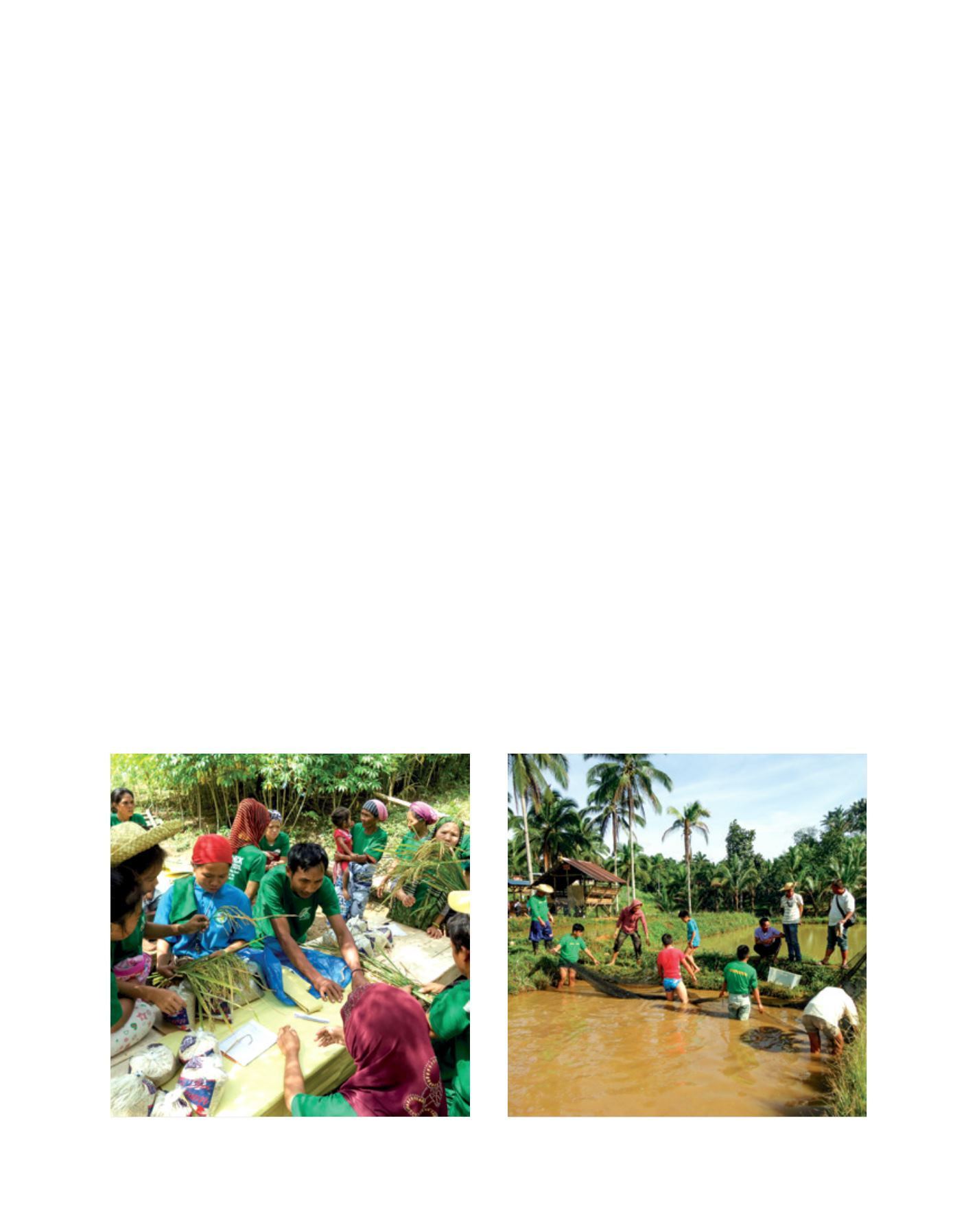

[
] 203
The programme mainly aims to nurture harmony in areas
where rebellion was or is still existent through advocating
agriculture and fishery. As the extension arm of the Philippine
Department of Agriculture, ATI took the initiative to look into
the needs of the commanders and their respective groups.
This was made possible with the support of the local govern-
ment unit of Kauswagan, Lanao Del Norte in Mindanao.
ATI risked going the extra mile and passing through the
bumpy roads infested by unseen insurgents ready to attack at
any time in the mountain ranges of Lanao Del Norte. Setting
aside fear, the leaders’ camps and communities were visited by
the programme initiator to directly determine what assistance
the agency could provide. Extension services were then deliv-
ered through technical assistance and trainings on organic
agriculture, vegetable production, livestock and other capabil-
ity building and skills exercises that help in capacitating the
marginalized in the countryside. Post-training support and
education support for the out-of-school youth were likewise
dispensed through the programme.
The former rebel leaders, who are also heads of specific
Maranao ethnic groups, were first trained by ATI. Being the
forerunners emulated by their followers, the commanders were
taken to experience and see the developments made by other
successful farmers in the region. From the farm visits, leaders
were able to choose commodities that are suitable in their own
areas. The trips also enabled the former commanders to gain
insights into how they could improve their own lands.
The rebel leaders were shown that the real enemy is not the
Government but hunger. The real war is the combat against
poverty and illiteracy. ATI has not only promoted agricul-
ture and fishery among the former rebel families, but has also
provided non-formal education to the constituents of the
commanders by administering trainings. More importantly, a
number of out-of-school youth from the Maranao community
were given the chance to become scholars of ATI’s ladderized
training courses on agri-entrepreneurship. The ladderized
training course programme is a two-year agriculture-based
curriculum wherein 30 per cent concentrates on the theo-
retical aspect of agriculture entrepreneurship through lectures
while 70 per cent focuses on hands-on practicum where
students get first-hand experience of farming technologies in
the developed farms of productive farmers.
Among the former rebel leaders who are now catering to
students in their farms are Commander Malic Dimakuta and
Commander Aga Macabato. Through the Schools for Practical
Agriculture programme – also an innovation of Director Saliot
– former rebel leaders Malic and Aga have become farmer lectur-
ers. Their farms serve as the school while they act as the teachers
imparting knowledge learned from ATI’s trainings to students
taking up the ladderized programme. With the scheme, farmers
are able to earn more than enough from their honorarium as
teachers and from the lodging fees of the scholars. This goes to
prove that farming, provided with the appropriate techniques,
generates income; that indeed there is money in agriculture.
Bringing in technologies and promoting farming in the
war zones did not just convey peace and non-formal educa-
tion and eliminate hunger in the conflict communities that
committed to do so. More than that – family groups have
been uplifted and strengthened.
The endeavour has served as an avenue for achieving peace,
addressing hunger, providing education and alleviating poverty
in certain farming communities in Mindanao. To date, the
programme is assisting 12 leaders, of whom 10 are commander
returnees while two are still active rebels who have been encour-
aged to join the programme. They need not surrender their
firearms; the only thing asked from the rebel returnees and rebels
who wanted to be part of the programme is their change of heart
–a heart committed to farming and not to warfare. In a dialogue,
the rebel returnees convinced by the intervention have expressed
their commitment to the goals of the programme in promoting
Commander Ismael demonstrating rice technologies to his villagers
Youth scholars and villagers fishing in Commander Aga’s tilapia pond
Image: ATI-RTC 10
Image: Renelle Joy Tabinas
D
eep
R
oots
















